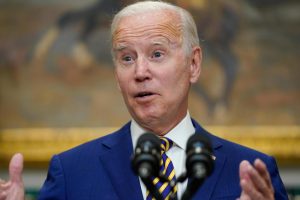Taiwanese President Tsai Ing-wen confirmed for the first time Tuesday that American troops are on the island and helping train her military forces.
The confirmation comes as the Asian democracy and the U.S. seek to counter an increasingly bellicose communist China, whose leader, Xi Jinping, has clearly stated his intention to reunite the island with the mainland.
Xi said earlier this month that Taiwan’s independence is a “grave lurking threat to national rejuvenation” and added that while China wants a peaceful unification, “nobody should underestimate the staunch determination, firm will and powerful ability of the Chinese people to defend national sovereignty,” 19FortyFive reported.
Taiwan has governed itself separately from Beijing since the Nationalist forces retreated to the island at the end of the Chinese Civil War in 1949.
President Joe Biden may well be left with two choices in the not too distant future: backing Taiwan or once again retreating in the face of a militant foe.
Taiwan’s Foreign Minister Joseph Wu said during an interview on Australian television that Beijing flew nearly 150 military aircraft, including fighters and nuclear-capable bombers, into Taiwan’s airspace during the first five days of October, Stars and Stripes reported.
Last week during a CNN town hall, Biden said the U.S. would come to Taiwan’s defense in the event of a military strike by China.
“Yes, we have a commitment to do that,” he unequivocally stated.
White House press secretary Jen Psaki walked back that statement the next day, saying, “Our defense relationship with Taiwan is guided by the Taiwan Relations Act [1979]. Some of the principles of the Taiwan Relations Act that the United States will continue to abide by, of course, is assisting Taiwan in maintaining a sufficient self-defense capability.
“Another principle is that the United States would regard any effort to determine the future of Taiwan by other than peaceful means a threat to the peace and security of the Western Pacific and of grave concern to the United States.”
That’s government/diplomatic speak translating to, “Don’t count on the U.S. to directly intervene.”
Tsai conceded there are “different interpretations” as to what Biden meant but told CNN’s Will Ripley she’s confident the U.S. would come to Taiwan’s aid.
“I do have faith, given the long-term relationship that we have with the U.S.,” the president said, “and also the support of the people of the U.S. as well as the Congress, and the administration has been very helpful.”
“Here is this island of 23 million people trying hard every day to protect ourselves and protect our democracy and making sure that our people have the kind of freedom they deserve,” she said.
“If we fail, then that means people that believe in these values would doubt whether these are values that they [should] be fighting for.”
CNN reported that the U.S. military posted (and soon thereafter deleted) a video in early 2020 of U.S. Army Special Forces training Taiwanese troops.
Tsai would not confirm how many U.S. soldiers are there now but said “not as many as people thought.”
“We have a wide range of cooperation with the U.S. aiming at increasing our defense capability,” she added.
According to CNN, Defense Department records officially show 32 U.S. Marines stationed in Taiwan assigned to embassy security.
However, it’s safe to say that figure would not include temporary deployments of troops to Taiwan like Special Forces trainers.
Additionally, the U.S. sold over $5 billion in weapons to Taiwan in 2020, Reuters reported.
Former Trump Secretary of State Mike Pompeo told Newsmax on Sunday that Biden must keep his commitment to defend Taiwan from China.
“I saw President Biden say that we have a commitment to defend Taiwan,” Pompeo said.
“I hope that when he said that he was intent upon that,” he continued. “You can’t draw a red line like that. You can’t make statements like that and not mean them.
President Biden said that we have a commitment to defend Taiwan. There’s an expectation now that he will follow through on that commitment, and I hope the Biden Administration will. https://t.co/RyKDYOEy5P
— Mike Pompeo (@mikepompeo) October 26, 2021
“There’s an expectation now that he will follow through on that commitment, and I hope the Biden administration thought that through, and it wasn’t just a random comment from a president who wasn’t clear about what he was saying.”
The challenge Biden faces in keeping China in check is a credibility gap he created with the disastrous Afghanistan withdrawal in August.
Viewed from a macro level, America’s performance and acquiescence to the Taliban can only serve to embolden China to strike against Taiwan, forcing Biden to choose between war and retreat.
“Peace through strength” was former President Ronald Reagan’s motto in dealing with the Soviet Union.
Biden would do well to study the 40th president’s Cold War leadership as the world faces a rising communist China threat.






